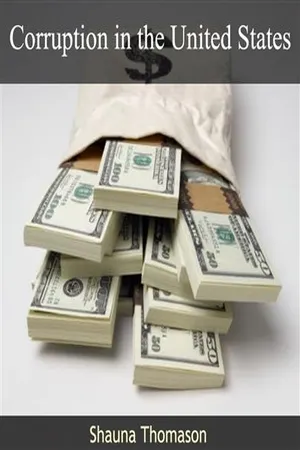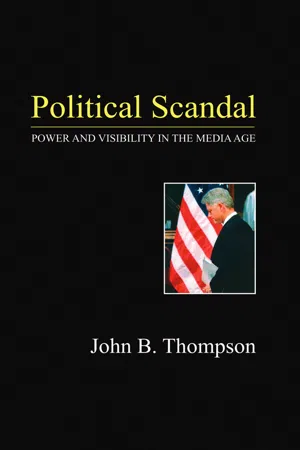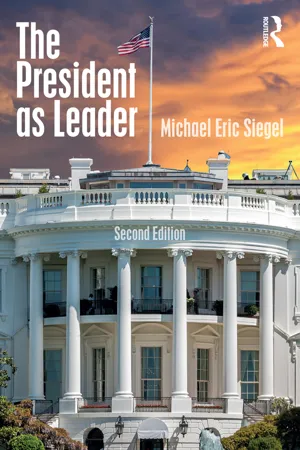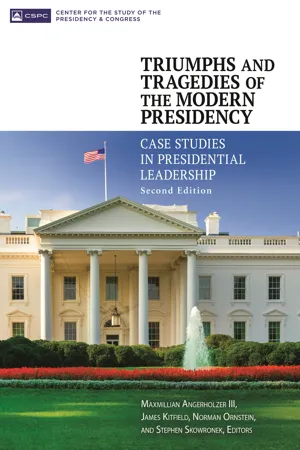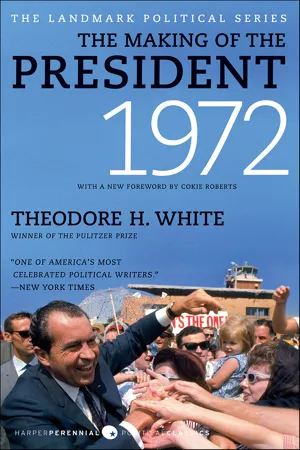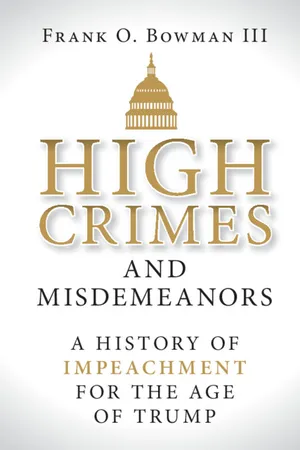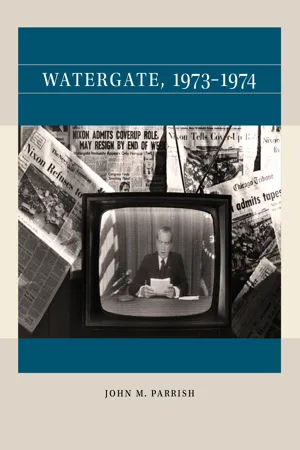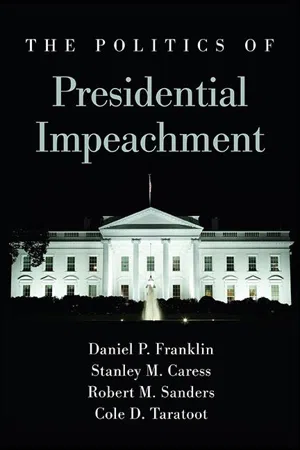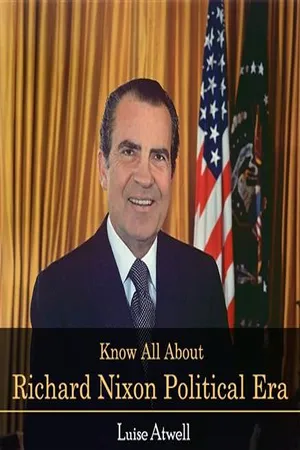History
Watergate Scandal
The Watergate Scandal was a political scandal in the 1970s that involved the break-in at the Democratic National Committee headquarters and subsequent cover-up by the Nixon administration. The scandal led to President Richard Nixon's resignation and eroded public trust in the government. It also resulted in reforms to increase transparency and accountability in government, leaving a lasting impact on American politics.
Written by Perlego with AI-assistance
Related key terms
1 of 5
11 Key excerpts on "Watergate Scandal"
- No longer available |Learn more
- (Author)
- 2014(Publication Date)
- University Publications(Publisher)
____________________ WORLD TECHNOLOGIES ____________________ Chapter- 3 Watergate Scandal The Watergate Scandal was a 1970s United States political scandal resulting from the break-in to the Democratic National Committee headquarters at the Watergate office complex in Washington, D.C. Effects of the scandal ultimately led to the resignation of the President of the United States, Richard Nixon, on August 9, 1974, the first and only resignation of any U.S. President. It also resulted in the indictment, trial, conviction and incarceration of several Nixon administration officials. The affair began with the arrest of five men for breaking and entering into the Democratic National Committee headquarters at the Watergate complex on June 17, 1972. The FBI connected the payments to the burglars to a slush fund used by the 1972 Committee to Re-elect the President. As evidence mounted against the president's staff, which included former staff members testifying against them in an investigation conducted by the Senate Watergate Committee, it was revealed that President Nixon had a tape recording system in his offices and that he had recorded many conversations. Recordings from these tapes implicated the president, revealing that he had attempted to cover up the break-in. After a series of court battles, the U.S. Supreme Court ruled that the president had to hand over the tapes; he ultimately complied. Facing near-certain impeachment in the House of Representatives and a strong possibility of a conviction in the Senate, Nixon resigned the office of the presidency on August 9, 1974. His successor, Gerald Ford, issued a pardon to President Nixon after his resignation. Break-in ____________________ WORLD TECHNOLOGIES ____________________ The Watergate complex, where the break-in occurred On the evening of June 17, 1972, Frank Wills, a security guard at the Watergate Complex, noticed tape covering the latch on locks on several doors in the complex (leaving the doors unlocked). - eBook - PDF
- David Hosansky(Author)
- 2006(Publication Date)
- CQ Press(Publisher)
The Senate created a special committee to investigate the Watergate Scandal in February 1973. It took this action in response to growing concerns about the scope of the Watergate break-in and coverup. The Watergate Scandal began as a seemingly isolated criminal event. Police arrested five burglars who had bro-ken into the Democratic national headquarters in the Watergate office complex early in the morning of June 17, 1972. President Nixon, untarnished by the news about Watergate, easily won re-election a few months later. But by the spring of 1973, the break-in had developed into one of the biggest political scandals in American history. As one disclosure followed another, Watergate was recognized as one piece of a much larger operation involving political spying and sabotage. Reports emerged of large amounts of secret campaign cash that were used to finance illegal operations. The scandal threatened to implicate a number of White House officials. In the months following the break-in, the five burglars and two accomplices had either pleaded guilty to serious criminal charges or been convicted. But many important elements of the scandal remained unsolved. One of the biggest mysteries was the role of the White House, and even of President Nixon himself. A federal grand jury was investigating the matter. But with the public losing confi-dence in the president, many believed that a congressional investigation was needed to dig out all the facts. INCREASING QUESTIONS The Watergate break-in quickly spawned charges of serious political wrongdoing. A top Democratic campaign official charged that Republicans had been wiretapping Democra-tic headquarters before the June 17 arrests. News stories linked the wiretapping with officials in the White House and Nixon’s re-election campaign. The press also reported on large sums of campaign contributions that were used to fund the Republicans’ espionage operations. - eBook - ePub
Political Scandal
Power and Visability in the Media Age
- John B. Thompson(Author)
- 2013(Publication Date)
- Polity(Publisher)
It is partly because power scandals are the purest form of political scandal that they have come to assume such significance within the political field. What we see in power scandals is not the illicit intrusion of extraneous factors – sex, money – into the field of political power, but rather the illicit use of political power itself. This phenomenon is particularly troubling in liberal democratic societies, precisely because these are societies in which the exercise of political power is based on the rule of law; hence the flouting of these rules can be seen or portrayed as an activity which undermines the very foundations of legitimate power. This helps to explain why one of the greatest scandals of the modern period – Watergate – has acquired a kind of paradigmatic status, becoming the reference point (exemplified by the widespread use of the suffix ‘-gate’) for many subsequent scandals. Watergate stands out as an emblem of modern political scandals because what was at stake in this affair was whether the highest officer of the state – the President – had secretly flouted the rules, laws and procedures governing the legitimate exercise of power. But Watergate was also significant because it highlighted the fact that, behind the public settings in which political power is visibly exercised, there were hidden forms of power and decision-making which were unaccountable and which could, on occasion, involve illicit or even criminal action.In this chapter I shall focus on power scandals and examine some of their features. I shall begin by analysing in more detail the nature of power scandals in relation to the political systems in which they occur. Then I shall look at some examples, but in this chapter I shall proceed a little differently from the previous two. Given the significance of Watergate as a power scandal, I shall begin by analysing this event and its aftermath; I shall also examine the most important American power scandal of the post-Watergate age, the Iran-Contra affair. I shall then turn to Britain and retrace the rise of a particular genre of power scandal – what I shall call ‘security scandals’ – which, for various reasons, have featured prominently in Britain since the late nineteenth century. The final section will focus on one area of the British political system which has proved to be a particularly fertile source of power scandals in recent years: the blurred boundary between the political and military domains. - eBook - ePub
- Michael Eric Siegel(Author)
- 2017(Publication Date)
- Routledge(Publisher)
88 A third of the Republican members joined a unanimous Democratic majority in approving the articles of impeachment. The Supreme Court, with four sitting members appointed by Nixon, voted 8–0 that President Nixon was obligated by law to turn over all of the subpoenaed tape recordings. Days later the president’s attorney revealed a tape recording from June 23, 1972, capturing a communication between Nixon and his aides in which the president asked them to use the CIA to disturb the FBI’s investigation of Watergate. This became known as the “smoking gun tape,” and shortly after its release, all members of the House Judiciary Committee – including Nixon’s most zealous supporters – declared they were now pursuing impeachment. Knowing that he had little support left in the U.S. Senate, two months later, on August 9, 1974, President Nixon resigned.The meaning of Watergate will be debated for years to come,89 but there is no debate that it caused a very strong reaction in the American political system. The late Washington Post editor, Katherine Graham, summarized the meaning of Watergate as follows:And for the particular focus of this book—the presidency—Watergate had a profound effect. According to historian Arthur Schlesinger Jr.:Even today, some people think that the whole thing was a minor peccadillo, the sort of thing engaged in by lots of politicians. I believe Watergate was an unprecedented effort to subvert the political process. It was a pervasive, indiscriminate use of power and authority from an administration with a passion for secrecy and deception and an astounding lack of regard for the normal constraints of democratic politics. To my mind, the whole thing was a very real perversion of the democratic system—from firing people who were good Republicans but who might have disagreed with Nixon in the slightest, to the wiretappings, to the breaking and entering of Ellsberg’s psychiatrist’s office, to the myriad dirty tricks, to the attempts to discredit and curb the media. As I said in a speech at the time, “It was a conspiracy not of greed but of arrogance and fear by men who came to equate their own political well-being with the nation’s very survival and security.”90Watergate’s importance was not simply in itself. Its importance was in the way it brought to the surface, symbolized and made politically accessible the great question posed by the Nixon Administration in every sector—the question of presidential power. The unwarranted and unprecedented expansion of presidential power, because it ran through the whole Nixon system, was bound, if repressed at one point, to break out at another. This, not Watergate, was the central issue.91 - eBook - ePub
Something Happened
A Political and Cultural Overview of the Seventies
- Edward D. Berkowitz(Author)
- 2005(Publication Date)
- Columbia University Press(Publisher)
1 Nixon, Watergate, and Presidential ScandalDuring the seventies, America devoured its presidents in what journalist Max Lerner described as fits of “tribal cannibalism.”1 Richard Nixon, the first of the era’s presidents, sent the institution on a downward spiral. The Watergate Scandal that resulted from his misuse of power became one of the era’s signature events. It altered the course of electoral politics after 1973, enabled the legislative branch of government to gain power at the expense of the executive branch, increased the level of scrutiny of a president’s private behavior, and made Americans more cynical about the government’s ability to improve their well-being. Watergate also changed the career paths of politicians who aspired to the presidency. Beginning in 1976, governors, rather than senators, became president.THE LIFE OF RICHARD NIXONRichard Nixon, an intensely private man, lived one of the most public lives in American history. He was perhaps the last of the twentieth century politicians whose life spooled like a newsreel across the public imagination. Born in 1913, he spent his entire political career in the postwar, rather than the New Deal, era. The southern California of his youth resembled the pages of a John Steinbeck novel more than it reflected the glamour of nearby Hollywood. Still, Nixon found the means to attend college, a fact that set him apart from most people his age. Graduating in 1934 from Whittier College, a Quaker school located near his hometown, he earned a scholarship to the newly established Duke Law School, finishing third in his class in 1937. At Duke he lived in such humble surroundings that he showered in the school gym. His situation reinforced his view of life as a struggle. He practiced law in Whittier before the war brought him briefly to Washington, D.C., for a job at the Office of Price Administration. In the Navy, he served as a transport officer in the South Pacific. Discharged in 1946, he returned home to run for Congress in the California district that included Whittier. Like John F. Kennedy, another Navy veteran and another distinguished postwar politician, he became a member of the Eightieth Congress, part of the insurgency that produced a Republican majority in both houses. It would happen only once more in Nixon’s political career.2 - eBook - PDF
Triumphs and Tragedies of the Modern Presidency
Case Studies in Presidential Leadership
- Maxmillian Angerholzer III, James Kitfield, Norman Ornstein, Stephen Skowronek, Maxmillian Angerholzer III, James Kitfield, Norman Ornstein, Stephen Skowronek(Authors)
- 2016(Publication Date)
- Praeger(Publisher)
SECTION V Presidential Scandals 54. Watergate: Dirty Tricks and Cover-Ups by John Aloysius Farrell Richard Nixon’s ruin began on Sunday, June 13, 1971, on the morning after his daughter, Tricia, married Edward Cox in the Rose Garden at the White House. On its front page that day, next to a photograph of the bride, the New York Times carried the first installment of what came to be known as “The Pentagon Papers,” a secret Defense Department study of the duplicitous government activity that led the United States into the Vietnam War. Nixon was at the nadir of his first term, a moment, he recalled, when his troubles were “so overwhelming and so apparently impervious” as to snuff his hopes for reelection. His approval rating had plummeted; less than half the country thought he was doing a good job. His foes were legion: in late April and early May, a half million antiwar protesters had gathered in Washington. The economy was uncooperative. “If the prospects are that dire,” Nixon told adviser George Shultz, after getting a gloomy report, “maybe we all better turn in our suits and run for the hills.” 1 In the Oval Office on Saturday, fretting as he waited for the rain to lift and give Tricia the outdoor wedding she so wanted, Nixon had raged, se- quentially, about his foes. It was an extensive list, that included “long-haired, dirty looking” protesters; the Eastern Establishment; feminists; teachers’ unions; Jews (“Goddamn, they are a vicious bunch”); African Americans (“We don’t do well with blacks. . . . We don’t want to do so damn well with blacks”); the “softies” of the Ivy League; the “ass kissers and butter up- pers” in the bureaucracy; and the “lousy, dirty . . . cowardly bastards” in the press. Nixon’s hopes rested with three potentially transformative initiatives: the secret Vietnam peace negotiations, back-channel talks on a strategic arms limitations treaty (SALT) and other issues with the Soviet Union, and an historic diplomatic opening to China. - eBook - ePub
- Theodore H. White(Author)
- 2010(Publication Date)
- HarperCollins e-books(Publisher)
CHAPTER ELEVENTHE WATERGATE AFFAIR
N O simple logic yet embraces what is known as the Watergate affair. In the word “Watergate” are contained a family of events, a condition of morality and a system of acts, charges, allegations which, until those accused have had their chance to speak in court and be judged by law, defy final judgment.Yet the story of Richard Nixon’s re-election cannot be told without it. That election was not a traditional party contest between Republicans and Democrats. As presented to the people, it was an election of ideas—sharp-set, harshly contrasted—and of two personalities who spoke clearly of their directions. But underneath their claims it was a clash of cultures breaking away from the old common culture of comity and civil peace that had once bound Americans together. Watergate was born of two new cultures which saw Americans as enemies of each other. And since the Committee for the Re-Election of the President struck the decisive blow against the old common culture, it is the Committee to Re-Elect that concerns us here.The Committee to Re-Elect was born of legitimate purpose, but was entrusted not only to men ignorant of American politics, but to amateurs who were among the most stupid and criminal operators in electoral history. Though after midsummer of 1972, under Clark MacGregor, it became one of the most efficient vote-management organizations in recent history, its direction at genesis begins in yet unanswered riddles: - eBook - PDF
High Crimes and Misdemeanors
A History of Impeachment for the Age of Trump
- Frank O. Bowman III(Author)
- 2019(Publication Date)
- Cambridge University Press(Publisher)
But the Nixon case may be most important in what it taught about how presidential conduct is to be investigated. In the trial of Andrew Johnson, there was never any serious dispute about the facts. Johnson was impeached for his official acts and public speeches. The question was whether what he did was properly impeachable. By contrast, Watergate was a “who- dunnit.” Or perhaps more aptly a “who-covered-it-up.” The big questions from beginning to end were largely about what happened, who ordered it, and who knew about what when. Once the factual questions were answered, the question of the president’s impeachability almost answered itself, even if the precise framing of appropriate charges remained a challenge. The hard constitutional questions in 180 Watergate almost all related to how wrongdoing by a president or presidential aides is to be investigated. Therefore, our discussion of the fall of Richard Nixon will concern in roughly equal measure what the president did, how the press, federal law enforcement agencies, courts, and Congress uncovered it, and how the House Judiciary Committee organized the facts into articles of impeachment. richard nixon and the prelude to watergate Richard Nixon was perhaps the most complex and contradictory figure in twentieth- century American politics. Born in Yorba Linda, California in 1913, the son of a struggling small businessman and a Quaker school teacher, Nixon grew up poor. He nonetheless managed to work his way through Whittier College and attend Duke Law School on scholarship. He served in the Navy in the Second World War. On his return home, he was invited by hometown Republican worthies to run for Congress against a long-time Democratic incumbent, Jerry Voorhis. - eBook - ePub
- John M. Parrish(Author)
- 2023(Publication Date)
- The University of North Carolina Press(Publisher)
Seen from this wider perspective—that the Watergate burglary might be a by-product of a larger campaign of covert Republican interference in the Democratic primary process—the seemingly mysterious motivelessness of the Watergate caper began to make more sense. For while at the time of the June break-in Nixon looked like a prohibitive favorite to win the election with a 61 percent approval rating, as recently as the previous winter, when the newly reported espionage and sabotage activities began, Nixon’s approval had stood at just 49 percent and the president had consistently trailed then front-runner Muskie in polls. The GOP’s dirty tricks began, then, at a time when Nixon very much had something to fear from the Democrats—especially from the Democrats who, in part thanks to the Republican sabotage efforts, had since been sidelined by the much less formidable nominee, George McGovern. 53 The Conspiracy Unravels Nevertheless, the Watergate story failed to gain significant traction in mainstream press coverage throughout 1972. Attorney General Richard Kleindienst, who oversaw the FBI, said publicly on August 28 that the bureau’s efforts had constituted “the most extensive, thorough, and comprehensive investigation since the assassination of President Kennedy.” Throughout the fall, Nixon repeatedly denied, directly and through subordinates, any connection to the burglary. (See core texts “Richard Nixon, The President’s News Conference [June 22, 1972]” ; “Richard Nixon, The President’s News Conference [August 29, 1972]” ; and “Richard Nixon, The President’s News Conference [October 5, 1972].”) Even the entry of the highly regarded Walter Cronkite and CBS News into the fray in October, devoting a nearly unprecedented fourteen minutes of his half-hour broadcast to Watergate, had no discernible effect on public opinion - eBook - ePub
- Daniel P. Franklin, Stanley M. Caress, Robert M. Sanders, Cole D. Taratoot(Authors)
- 2020(Publication Date)
- SUNY Press(Publisher)
Some of the same factors present in the Johnson impeachment resurfaced during Nixon’s tenure. Both Nixon and Johnson served during intensely emotional times when extreme governmental actions seemed justifiable. The Vietnam War’s level of carnage was devastating, and even though the number of Americans killed in it never approached that of the Civil War, Vietnam divided the country more than any other conflict in over a century. During Nixon’s years in office, the country was still shaken by the assassinations of President John Kennedy, Senator Robert Kennedy, and the Reverend Martin Luther King Jr., just as the country was in mourning for Abraham Lincoln during Johnson’s presidency. And, most critically, both Nixon and Johnson were confronted by a Congress in which the overwhelming number of members were from the opposite party. This was up to this time not the norm in American politics. These and other factors suggest that a thorough analysis will help us understand why presidential impeachment so abruptly reappeared during Nixon’s presidency.Why Impeachment ResurfacedIn 1973, after Richard Nixon’s impressive reelection triumph, the mere thought of a presidential impeachment seemed inconceivable. Gradually, as revelations unfolded related to what became known as the Watergate Affair, momentum built that led to the first serious attempt to remove a president from office in over a hundred years. The proximate cause of the Nixon impeachment emerged from a seemingly unrelated burglary of a Democratic Party office. The break-in attempt of the national Democratic Party headquarters in the Watergate office complex in Washington, DC, during the 1972 election eventually evolved into a national scandal.1While the Watergate break-in was initially treated as an ordinary criminal case, it led to an inquiry by the FBI and a Senate committee that uncovered startling information about the possible involvement in a cover-up of the burglary by the president’s Committee for the Re-election of the President (CRP). Over the course of the next few months an investigation by a special prosecutor (and a couple of intrepid reporters at the Washington Post - No longer available |Learn more
- (Author)
- 2014(Publication Date)
- The English Press(Publisher)
In one of their last meetings, all of which took place at an underground parking garage somewhere in Washington DC at 2:00 AM, Deep Throat cautioned Woodward that he might be followed and not to trust their phone conversations. Rather than ending with the trial and conviction of the burglars, the investigations grew broader; a Senate committee chaired by Senator Sam Ervin was set up to examine Watergate and began issuing subpoenas to White House staff members. On April 30, 1973, Nixon was forced to ask for the resignation of two of his most influential aides, H. R. Haldeman and John Ehrlichman, both of whom were indicted and ultimately went to prison. He also fired White House Counsel John Dean, who went on to testify before the Senate and become the key witness against President Nixon. The President announced these resignations in an address to the American people: ________________________ WORLD TECHNOLOGIES ________________________ In one of the most difficult decisions of my Presidency, I accepted the resignations of two of my closest associates in the White House, Bob Haldeman, John Ehrlichman, two of the finest public servants it has been my privilege to know. Because Attorney General Kleindienst, though a distinguished public servant, my personal friend for 20 years, with no personal involvement whatsoever in this matter has been a close personal and professional associate of some of those who are involved in this case, he and I both felt that it was also necessary to name a new Attorney General. The Counsel to the President, John Dean, has also resigned. —Richard Nixon, On the same day, Nixon appointed a new Attorney General, Elliot Richardson, and gave him authority to designate, for the Watergate inquiry, a special counsel who would be independent of the regular Justice Department hierarchy. In May 1973, Richardson named Archibald Cox to the position.
Index pages curate the most relevant extracts from our library of academic textbooks. They’ve been created using an in-house natural language model (NLM), each adding context and meaning to key research topics.
